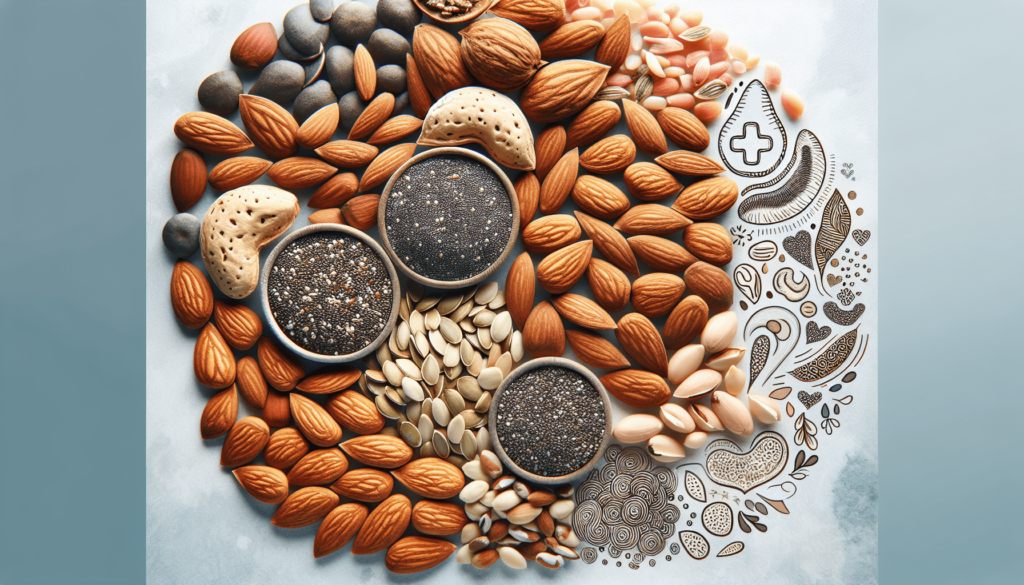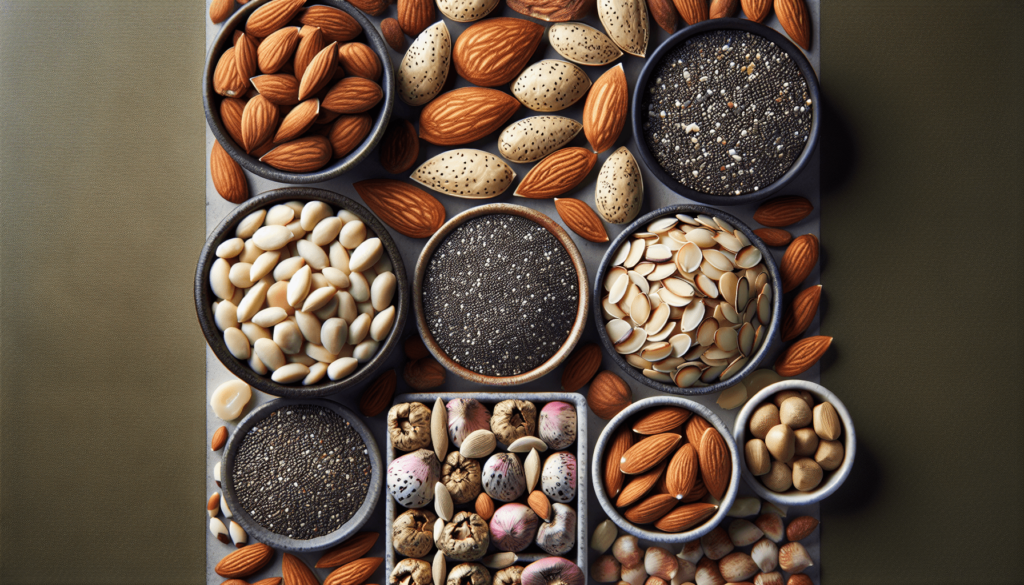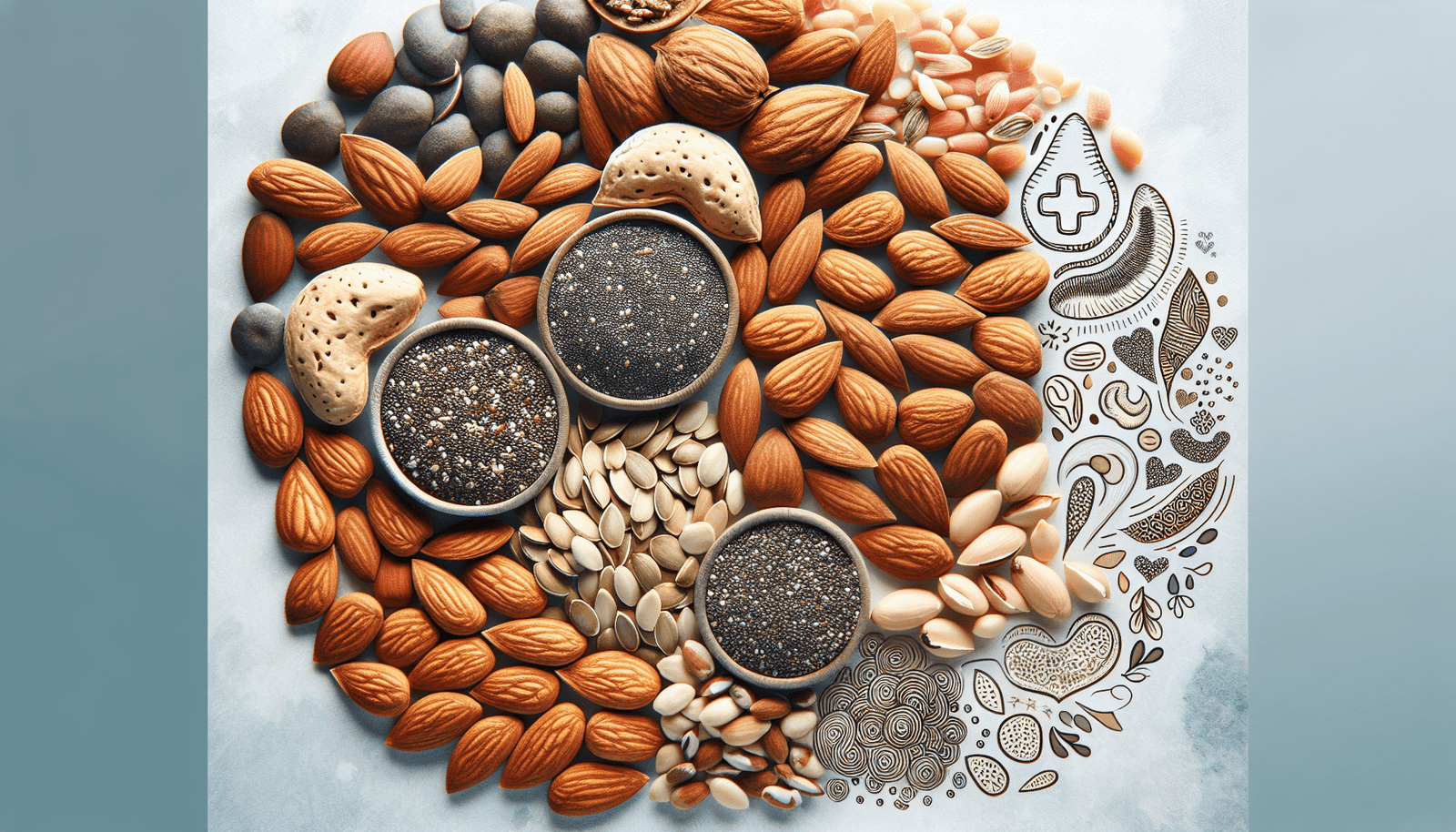Are you curious about which nuts and seeds are considered the most gut-friendly? Look no further! In this article, we will explore the different varieties of nuts and seeds that can promote a healthy gut. From almonds to chia seeds, we will uncover the digestive benefits of these delicious and nutritious foods. So, grab a snack and get ready to discover which nuts and seeds can support your gut health.
Almonds
Rich in fiber
Almonds are not only a delicious and nutritious snack but also highly beneficial for your gut health. One of the reasons why almonds are considered gut-friendly is because they are rich in fiber. Fiber plays a crucial role in maintaining a healthy digestive system and promoting regular bowel movements. By including almonds in your diet, you can increase your intake of dietary fiber, which can help prevent constipation and keep your gut functioning smoothly.
Contain healthy fats
In addition to being a great source of fiber, almonds also contain healthy fats. These fats, such as monounsaturated and polyunsaturated fats, are essential for overall health, including gut health. Healthy fats play a vital role in reducing inflammation in the body, which can contribute to a healthier gut environment. Including almonds in your diet can provide you with a good source of healthy fats, which can have a positive impact on your gut health.
High in antioxidants
Antioxidants are known for their ability to combat oxidative stress and protect the body against damage caused by free radicals. Almonds are rich in antioxidants, such as vitamin E, which can contribute to a healthier gut. Antioxidants help to reduce inflammation in the gut and promote the growth of beneficial gut bacteria. By incorporating almonds into your diet, you can enjoy the benefits of these powerful antioxidants and support a healthy gut.
Walnuts
Good source of omega-3 fats
Walnuts are often considered one of the best sources of omega-3 fatty acids among nuts and seeds. Omega-3 fats are essential for maintaining gut health as they have anti-inflammatory properties. Including walnuts in your diet can help reduce inflammation in the gut, alleviate digestive issues, and promote a healthier gut microbiome.
May promote gut health
The consumption of walnuts has been linked to improved gut health. Walnuts contain prebiotic properties, which means they serve as food for beneficial probiotic bacteria in your gut. These good bacteria help to maintain a healthy balance in the digestive system and support optimal gut function. By adding walnuts to your meals or enjoying them as a snack, you can promote a favorable gut environment.
Provide essential nutrients
Walnuts are packed with essential nutrients that are beneficial for overall health, including gut health. They are rich in vitamins, minerals, and antioxidants that promote optimal digestive function. By incorporating walnuts into your diet, you can ensure that your body receives these important nutrients and support a healthy gut.

Pistachios
High in fiber
Pistachios are not only a tasty and satisfying snack, but they also offer numerous benefits for your gut health. One of the key attributes of pistachios is their high fiber content. Fiber is essential for maintaining regular bowel movements and preventing constipation. Consuming pistachios can increase your fiber intake and promote a healthy digestive system.
Support gut-friendly bacteria
Maintaining a healthy balance of gut bacteria is crucial for optimal gut health. Pistachios have been found to support the growth of beneficial bacteria in the gut, such as Bifidobacterium and Lactobacillus. These bacteria can enhance digestion, improve nutrient absorption, and support overall gut function. By including pistachios in your diet, you can promote the growth of these gut-friendly bacteria and support a healthy gut microbiome.
Contain beneficial plant compounds
Pistachios are rich in beneficial plant compounds, such as polyphenols and antioxidants. These compounds have been shown to have anti-inflammatory and antioxidant properties, which can help reduce gut inflammation and protect against oxidative damage. By enjoying pistachios as part of your diet, you can harness the benefits of these plant compounds and contribute to better gut health.
Chia Seeds
Excellent source of fiber
Chia seeds have gained popularity in recent years due to their impressive nutritional profile. These tiny seeds are an excellent source of fiber, which is crucial for maintaining a healthy gut. Consuming chia seeds can help regulate bowel movements, prevent constipation, and support overall gut function.
Help regulate bowel movements
The high fiber content of chia seeds makes them a natural ally for maintaining regular bowel movements. When consumed, chia seeds absorb liquid and form a gel-like substance in the digestive tract. This gel helps to soften stools and promote their movement through the intestines, preventing constipation and ensuring smooth digestion. By incorporating chia seeds into your diet, you can help regulate your bowel movements and support a healthy gut.
Promote the growth of probiotics
Probiotics are beneficial bacteria that play a crucial role in maintaining a healthy gut. Chia seeds contain prebiotic fibers, which serve as food for these probiotics. By consuming chia seeds, you can stimulate the growth of good bacteria in your gut, which can improve digestion, enhance nutrient absorption, and support overall gut health.

Flaxseeds
Rich in omega-3 fats
Flaxseeds are another excellent source of omega-3 fatty acids, which are essential for gut health. Omega-3 fats have anti-inflammatory properties that can reduce gut inflammation and promote a healthy gut environment. Incorporating flaxseeds into your diet can provide you with a natural source of these beneficial fats and contribute to better gut health.
Boost gut health
The combination of fiber and omega-3 fats in flaxseeds makes them a powerful ingredient for boosting gut health. Flaxseeds can help regulate bowel movements, prevent constipation, and promote a healthy digestive system. Additionally, the omega-3 fats in flaxseeds can improve gut barrier function, reduce inflammation, and support overall gut health.
High in fiber
Like many other seeds, flaxseeds are high in fiber. Fiber is essential for maintaining regular bowel movements and preventing digestive issues. By adding flaxseeds to your meals or incorporating them into your baking recipes, you can increase your fiber intake and support optimal gut function.
Pumpkin Seeds
Support digestive health
Pumpkin seeds have long been recognized for their potential benefits for digestive health. These seeds are packed with a variety of nutrients, including fiber, magnesium, and zinc, which are essential for maintaining a healthy gut. Consuming pumpkin seeds can support optimal digestion, alleviate digestive discomfort, and promote a healthy gut environment.
Contain gut-friendly nutrients
Pumpkin seeds are a rich source of nutrients that are known to support gut health. Magnesium, for example, plays a crucial role in maintaining proper muscle function in the digestive tract and preventing constipation. Zinc is another important nutrient found in pumpkin seeds, which supports immune function and helps heal the gut lining. By including pumpkin seeds in your diet, you can provide your body with these gut-friendly nutrients and support a healthy gut.
Provide antioxidants
Antioxidants are compounds that help protect the body against damage caused by free radicals. Pumpkin seeds are a rich source of antioxidants, such as vitamin E and carotenoids. These antioxidants can reduce inflammation in the gut and promote optimal gut health. By enjoying pumpkin seeds as a snack or incorporating them into your meals, you can benefit from these powerful antioxidants and support a healthy gut.
Sunflower Seeds
Good source of fiber
Sunflower seeds are not only a popular snack but also a great addition to a gut-friendly diet. These seeds are a good source of dietary fiber, which plays a crucial role in maintaining regular bowel movements and preventing digestive issues. By including sunflower seeds in your diet, you can increase your fiber intake and support a healthy digestive system.
Promote healthy digestion
Sunflower seeds can promote healthy digestion due to their rich nutrient profile. They contain essential minerals, such as magnesium and selenium, which are important for proper digestive function. Additionally, the fiber content in sunflower seeds can help regulate bowel movements and alleviate constipation. By incorporating sunflower seeds into your diet, you can support healthy digestion and ensure your gut functions optimally.
Rich in essential nutrients
Sunflower seeds are packed with essential nutrients that are beneficial for overall health, including gut health. They are a good source of vitamins, such as vitamin E and vitamin B6, which play a vital role in supporting optimal digestive function. By including sunflower seeds in your meals or enjoying them as a topping on salads or snacks, you can provide your body with these important nutrients and promote a healthy gut.
Hemp Seeds
High in fiber
Hemp seeds are a versatile and nutrient-dense addition to your diet, especially when it comes to gut health. One of the key attributes of hemp seeds is their high fiber content. Fiber is essential for maintaining regular bowel movements and preventing digestive issues. By incorporating hemp seeds into your meals or snacks, you can increase your fiber intake and support a healthy digestive system.
Support gut health
Hemp seeds offer numerous benefits for your gut health. They contain a variety of beneficial plant compounds, such as polyphenols and omega-3 fats, that support optimal gut function. These plant compounds have anti-inflammatory properties and can help reduce gut inflammation, alleviate digestive issues, and promote a healthier gut microbiome. By including hemp seeds in your diet, you can support the health of your gut and enjoy its many benefits.
Provide essential fatty acids
Hemp seeds are rich in essential fatty acids, including omega-3 and omega-6 fats. These fats are crucial for maintaining a healthy gut and overall well-being. Omega-3 fats, in particular, have anti-inflammatory properties that can reduce gut inflammation and support a healthy gut environment. By incorporating hemp seeds into your diet, you can provide your body with these essential fatty acids and promote optimal gut health.
Brazil Nuts
Rich in selenium
Brazil nuts are a unique addition to a gut-friendly diet due to their rich selenium content. Selenium is a mineral that plays a crucial role in maintaining proper gut function and overall health. It has antioxidant properties that can reduce gut inflammation and protect against oxidative damage. By including Brazil nuts in your diet, you can ensure that your body receives an adequate amount of selenium and support a healthy gut.
Support digestive health
The combination of fiber and selenium in Brazil nuts makes them a beneficial food for digestive health. Fiber promotes regular bowel movements and prevents constipation, while selenium supports proper gut function and reduces inflammation. By enjoying Brazil nuts as a snack or incorporating them into your meals, you can support a healthy digestive system and promote optimal gut health.
Contain fiber
Brazil nuts, like many other nuts and seeds, are also a good source of dietary fiber. Fiber is an essential nutrient for maintaining healthy digestion and preventing digestive issues. By including Brazil nuts in your diet, you can increase your fiber intake and support a healthy gut.
Cashews
Good source of healthy fats
Cashews are not only a delicious and versatile nut but also offer several benefits for gut health. Cashews are a good source of healthy fats, including monounsaturated fats and omega-3 fats. These fats are essential for maintaining a healthy gut and overall well-being. Monounsaturated fats can reduce inflammation in the gut, while omega-3 fats have anti-inflammatory properties. By including cashews in your diet, you can provide your body with these healthy fats and promote optimal gut health.
Support gut health
Cashews have been found to support gut health in several ways. They contain prebiotic fibers that serve as food for beneficial probiotic bacteria in the gut. These good bacteria help maintain a healthy gut environment and support optimal digestion. Additionally, cashews contain certain compounds, such as magnesium, that can soothe and relax the digestive system, alleviating symptoms of digestive discomfort. By incorporating cashews into your diet, you can support a healthy gut and enjoy its numerous benefits.
Provide important minerals
Cashews are packed with important minerals that are beneficial for gut health. They are a good source of magnesium, which plays a crucial role in maintaining proper muscle function in the digestive tract. Magnesium helps relax the muscles and promote smooth digestion. Cashews also contain zinc, which supports immune function and aids in the healing of the gut lining. By including cashews in your meals or enjoying them as a snack, you can provide your body with these important minerals and support a healthy gut.
In conclusion, incorporating a variety of nuts and seeds into your diet can have numerous benefits for your gut health. These gut-friendly foods are rich in fiber, healthy fats, essential nutrients, and antioxidants, all of which support optimal digestion and a healthy gut microbiome. Whether you choose to snack on almonds, walnuts, pistachios, chia seeds, flaxseeds, pumpkin seeds, sunflower seeds, hemp seeds, Brazil nuts, or cashews, you can enjoy the many advantages they offer for your gut health. So go ahead and include these nutrition-packed nuts and seeds in your daily meals and snacks to support a healthy gut and overall well-being.

